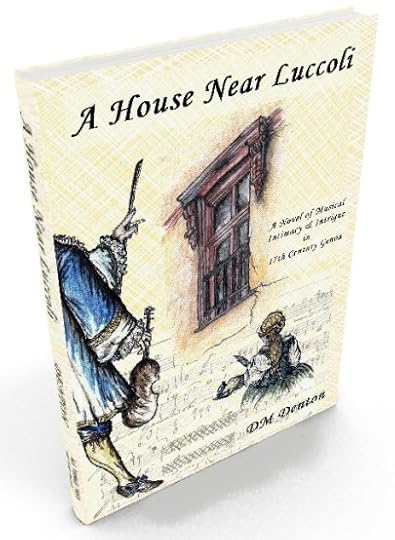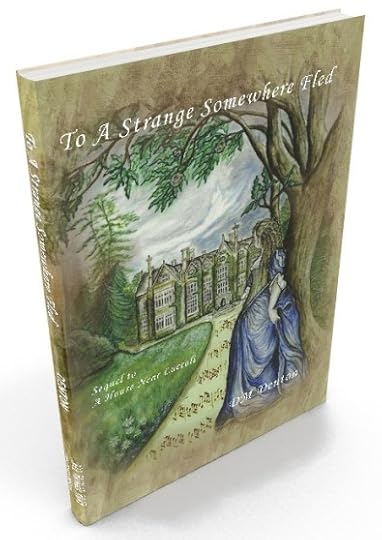D.M. Denton's Blog, page 6
March 21, 2021
Poetry for Disappearing Into
~ from Without the Veil Between, Anne Brontë: A Fine and Subtle Spirit
That I might simply fancy there
One little flower — a primrose fair,
Just opening into sight;
As in the days of infancy,
An opening primrose seemed to me
A source of strange delight.
Sweet Memory! ever smile on me;
Nature’s chief beauties spring from thee,
Oh, still thy tribute bring!
Still make the golden crocus shine
Among the flowers the most divine,
The glory of the spring.
~ from the poem, Memory, by Anne Brontë

Copyright 2018 by DM Denton
Despite the care of my 92 year old bedridden mother taking up most of my time and energy, I continue with my work-in-progress: a novel portrait of the Victorian poet Christina Rossetti (1830-1894), The Dove Upon Her Branch.
Through barely leafy woods there were early spring flowers to accidentally come upon and search for. Birds broke the silence as if noting her intrusion. Squirrels didn’t need prompting to squawk less musically while flying as ably from tree to tree. The way opening onto a field offered the sweetness of lambs and moist grass, the earth was green, the sky was blue*, Christina saw and heard a skylark hang between the two*. Shelly had written a longer and loftier poem inspired by that spritely bird that singing still dost soar, and soaring ever singest **.˜ excerpt from The Dove Upon Her Branch © 2021 by DM Denton*from The Skylark by Christina Rossetti
**from To the Skylark by Percy Shelly
Here is Christina’s exquisite poem, Spring, describing the burgeoning of the season, but, also, its transience.
Frost-locked all the winter,
Seeds, and roots, and stones of fruits,
What shall make their sap ascend
That they may put forth shoots?

Copyright 2018 by DM Denton
Tips of tender green,
Leaf, or blade, or sheath;
Telling of the hidden life
That breaks forth underneath,
Life nursed in its grave by Death.
Blows the thaw-wind pleasantly,
Drips the soaking rain,
By fits looks down the waking sun:
Young grass springs on the plain;
Young leaves clothe early hedgerow trees;
Seeds, and roots, and stones of fruits,
Swollen with sap put forth their shoots;
Curled-headed ferns sprout in the lane;
Birds sing and pair again.
There is no time like Spring,

Copyright 2018 by DM Denton
When life’s alive in everything,
Before new nestlings sing,
Before cleft swallows speed their journey back
Along the trackless track –
God guides their wing,
He spreads their table that they nothing lack, –
Before the daisy grows a common flower
Before the sun has power
To scorch the world up in his noontide hour.
There is no time like Spring,

Copyright 2018 by DM Denton
Like Spring that passes by;
There is no life like Spring-life born to die, –
Piercing the sod,
Clothing the uncouth clod,
Hatched in the nest,
Fledged on the windy bough,
Strong on the wing:
There is no time like Spring that passes by,
Now newly born, and now
Hastening to die.
~ Christina Georgina Rossetti

Copyright 2018 by DM Denton
There bloom immortal crocuses, beside
A live-rose hedge, and irises that grow
Along a far green inlet–circling wide
Anemone fields where none but stars may go.
The ardours of a thousand springs are there;
Through infinite deeps they quicken, bright and tender:
In that sequestered garden of the air …
~ from Winter Sunrise by Mary Webb

Copyright 2018 by DM Denton
 ©Artwork and writing, unless otherwise indicated, are the property of Diane M Denton. Please request permission to reproduce or post elsewhere with a link back to bardessdmdenton. Thank you.
©Artwork and writing, unless otherwise indicated, are the property of Diane M Denton. Please request permission to reproduce or post elsewhere with a link back to bardessdmdenton. Thank you.
February 16, 2021
The Cat and the Fiddle: In the Spirit of ‘Carnevale’ (for a second year despite Covid-19)
VENICE, Italy — In another year, masks would be a sign of the gaiety in Venice, an accessory worn for games and parties as big crowds parade about to show off their frivolous, fanciful costumes, especially ones with decorative face coverings.
The Italian canal city’s Carnival festivities should have started Saturday (January 30 – February 16, 2021), but the covid-19 pandemic has made its annual appointment for more than two weeks of merry-making impossible. https://www.arkansasonline.com
So, celebrate virtually with this post (that I bring out every year anyway) including an excerpt from my novel A House Near Luccoli.
Today, February 16, 2021 is Martedí Grasso (Fat Tuesday) of Carnevale, a final celebration before Ash Wednesday and Lent.“Life will show you masks that are worth all your carnivals”~ Ralph Waldo Emerson
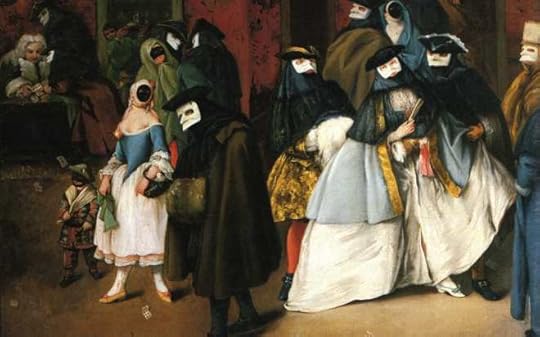
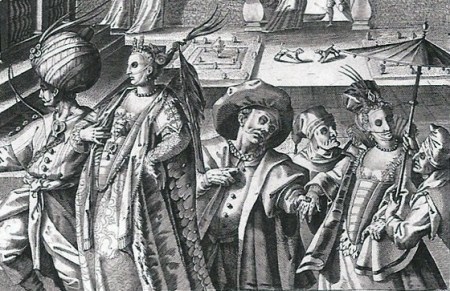
There are a few theories on where the name Carnevale originated, the most popular put to verse by Lord Bryon:
This feast is named the Carnival, which beingInterpreted, implies “farewell to flesh”:
So call’d, because the name and thing agreeing,
Through Lent they live on fish, both salt and fresh.
With roots in the Latin phrase carnem levare, “put away flesh” (carnem: flesh – levare: put away), the name evolved into carnelevare in Old Italian, then carnelevale, then carnevale, and, finally, carne, vale!—“Farewell, meat!”— appropriately referencing the Catholic tradition of giving up meat-eating from Ash Wednesday to Easter.
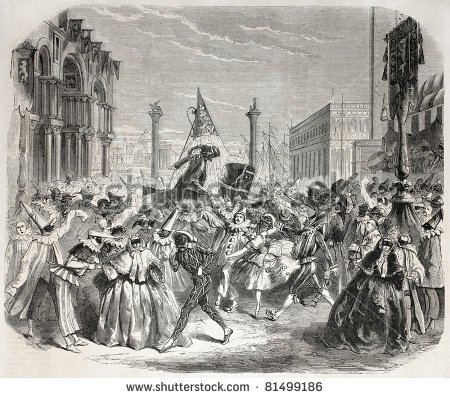
The Italian carnival that usually comes to mind has taken place in Venice since the eleventh century. In the seventeenth century these “Baroque celebrations” were “a way to save the prestigious image of Venice in the world” (Wikipedia), and it became even more popular and licentious in the 1700s until outlawed in 1797 when Venice was ruled by the King of Austria who also forbade the wearing of masks at any time. It reappeared during the nineteenth century, primarily for private celebrations and artistic expression. Carnevale di Venezia was revived in 1979 as an annual cultural event pronouncing Venice as even more magical and surreal with actors, acrobats, musicians, residents and visitors disguised in extravagant masks and costumes while enjoying themselves to the extreme.

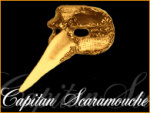
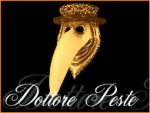
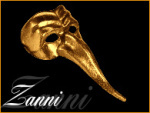

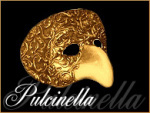
In the Middle Ages and Renaissance, many Italian cities had a tradition of mask-wearing, enabling questionable behavior among those needing to protect their reputations, laws passed to restrict masquerading to certain times of the year like Carnevale. Besides serving as subterfuge for inquisitors, spies, high officials and nobility who couldn’t resist behaving badly, donning masks presented an opportunity for covert defiance by those on the lower levels of society.

Copyright by DM Denton 2015
For those of you who have read my historical fiction A House Near Luccoli , you will know that Martedi Grasso offers some pivotal scenes. Although the novel begins a few years after the 17th century composer Alessandro Stradella ‘s arrival in Genoa, Carnevale was initially his reason for going (well, there might have been one or two other reasons …) and then he was encouraged to stay.This week I go to Genoa, invited by some gentlemen of that city, where I will spend carnival …
~ from a letter Stradella wrote to Polo Michiel (one of his patrons), dated Turin, 16 December, 1677

I arrived in Genoa safe and sound already last week, where I was favored by many gentlemen who vied to have me in their homes … And from the moment of my arrival till now, I have always had to spend my time with ladies and gentlemen, all greatly interested in me, and actually they favour me with so many kindnesses and so much applause that I do not know what more I could desire, and in every way they show very great pleasure in my inadequate talent.
~ from a letter Stradella wrote to Polo Michiel, dated Genoa, 8 January 1678 
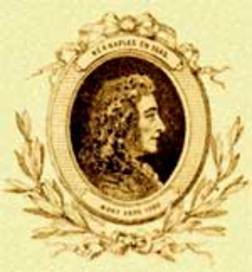
Wander through this brief moment in Italian Baroque musical history and let the author and Alessandro Stradella, Donatella, and a whole host of wonderful characters give you the “spirit of Carnevale“.
~ Martin Shone, author of the poetry collections Silence Happens, Being Human, and After the Rain.
Sleep well tonight. She wished she had taken his advice, but she couldn’t stop looking at the explicitly elegant gown hanging on the wardrobe. Nonna would have enjoyed the sight. It was silk and pearl buttoned, curving and billowing white, beribboned in sapphire and trimmed in bronze. Also warm and cold, tight and loose, depending on what the weather and outcome would be. A few hours later she was like a cat that had fallen from an open window, suddenly finding herself where she both longed and was afraid to be, feeling the hardness of pavement and softness of air.
Alessandro insisted she put on her mask again. “And practice on the way.”
“Practice what?”
“Walking like a cat, purring like a cat.”
“Really.” She wasn’t averse to doing so. “I’ve never seen a blue one.”
“You’ll see others turning green.”
Although her face was immovable and pale, she couldn’t hide her pleasure.
“All that’s left is for you to rub against my legs.”
Alessandro was all in white, as if he had absorbed winter from his hat like a boat with one wind-torn sail to frill topped hose and overly flapped boots. He was wimpled in lacy layers to his shoulders, tightly short coated and cavalier, out of fashion but not style, laddered rows of braid with buttons unfastened to the shine of his shirt also showing through gaping slashes on his sleeves. It would have been a perfect disguise but for the distinctiveness of his stride and attitude of his head exaggerated by a duckbill mask, the shine of his lower lip appearing when his expressive, unmistakable voice did.
~ Read full excerpt from A House Near Luccoli
The gift of a sonnet, ‘stolen’ music, inexpressible secrets,
and an irrepressible spirit
stow away on Donatella’s journeyTo A Strange Somewhere Fled (sequel to A House Near Luccoli)
 ©Artwork and writing, unless otherwise indicated, are the property of Diane M Denton. Please request permission to reproduce or post elsewhere with a link back to bardessdmdenton. Thank you.
©Artwork and writing, unless otherwise indicated, are the property of Diane M Denton. Please request permission to reproduce or post elsewhere with a link back to bardessdmdenton. Thank you.
January 16, 2021
Fluctuations
She rose, and brighter shone …
from Fluctuations by Anne Brontë
January 17, 2021, marks 201 years since Anne Brontë was born in Thornton, West Yorkshire, England, youngest of the six children of Maria Branwell from Penzance and Irish clergyman Patrick Brontë.
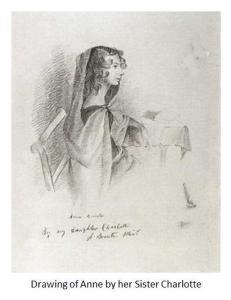
My novel Without the Veil Between, Anne Brontë: A Fine and Subtle Spirit is my love letter to Anne. Not Anne, the ‘less gifted’ sister of Charlotte and Emily … nor the Anne who ‘also wrote two novels’, but Anne herself, courageous, committed, daring and fiercely individual: a writer of remarkable insight, prescience and moral courage whose work can still astonish us today.
~ Deborah Bennison, Bennison Books
2020 was Anne’s bicentennial, celebrations unexpectedly and unfortunately curtailed by Covid-19 restrictions. Of course, honoring Anne can be done at any time by reading her poetry and prose and what others have been inspired to write about her; also, (perhaps, a way that would please her the most) by following her example of good and purposeful living achieved through resilience, faith, honesty, compassion and – invaluable during an isolating pandemic – self-containment, patience, and flexibility.

Anne’s two novels and unfinished ‘Portrait of a girl with a dog’
Anne thought of … a word, more than a word, a philosophy, simple but profound, out of the mouth of someone who spoke simply and succinctly, not unlike Tabby, or, in the old days, Nancy and Sarah Garrs, who sometimes shared wisdom with just a comment on the weather.
Copyright 2017 by DM Denton
“Fluctuations.”Now it was a title for a poem … Anne stroked Flossy’s ears as she began to quietly read out loud, “‘Fluctuations. What though the Sun had left my sky—’” Her doe-eyed companion looked up, understanding nothing and everything, wagging his tail and letting it drop limply, whining because he didn’t like it when his mistress was upset. “Shh, shh. It’s all right, sweet pup. ‘To save me from despair the blessed Moon arose on high, and shone serenely there.’”It was all right. It would be all right. Perhaps not every moment, not when she thought of who she must wait until she died to see again, or how there was less heartache but more frustration in believing she would never feel fully useful in society or even at home unless she accomplished something meaningful. Still, it could be worse if she was without the resolve to make her life fruitful, pursue a well-cultivated mind and well-disposed heart, have the strength to help others be strong, or, especially, the faith to endure and rise above endurance.“‘I thought such wan and lifeless beams could ne’er my heart repay, for the bright sun’s most transient gleams that cheered me through the day. But as above that mist’s control she rose and brighter shone—’” Flossy looked up at her again. “‘I felt a light upon my soul!’”Anne knew life couldn’t fail her as long as she acknowledged the blessings of animals and nature, music and prayer. She also valued family and friendship, which, of course, could be one and the same. At times it was stifling back at the parsonage, as though all the windows and doors that held her to being the smallest, quietest, last and least likely to surprise were kept locked by those who loved her for their own conclusions. Anne could never think of home as a prison, but once she flew the nest and realized she had the wherewithal to, if not quite soar, make survivable landings, she knew it was restrictive. She had always suspected being overly protected was as dangerous as being unguarded, like enjoying the rose without noticing its thorns. It wasn’t as though her family was unaware of the world and its ways. Daily and weekly doses of newspapers and magazines initiated lively discussions, mostly between Branwell and Charlotte with Emily grunting, about religion and revolution and parliamentary reform, potato famine and, closer to home, the plight of the wool laborers and sick in their father’s parish.Anne was afraid responding to political, social, and moral issues through the amusement of fantasy was more about outwitting these realities than addressing them. She even felt some shame at having gone along with the juvenilia that made believe the world was at her fingertips, its maneuverings entertaining, romantic, and escapist, although she could almost forgive the child she was then. Halfway through her twenties, having lived most of the last four years away from her family, she was finally fully-fledged, the nature she was born with at last standing up for itself, wanting its voice to be heard, with the courage to admit she was meant to wear truths not masks.In or away from Haworth, the best companionship was often with herself alone: the best being the reflection that wouldn’t falsely flatter for the sake of avoiding hard feelings, wasn’t eager to congratulate in order to keep her friendship, and didn’t encourage self-pity because it was wanted in return. Anne had long since decided to be honest with herself even when it meant facing a harsh reality, like the prospect of never marrying and having children. Whatever God’s will, she hoped a few of the schemes in her head, humble and limited as they were, might come to something. She could hear Emily guffawing. Why shouldn’t they? You worry too much. Yes, she did, a correction that was one of the most difficult to make if she thought she must choose between passion and dispassion.Excerpt from Without the Veil Between, Anne Brontë: A Fine and Subtle Spirit
Anne stroked Flossy’s ears as she began to quietly read out loud, “‘Fluctuations. What though the Sun had left my sky—’” Her doe-eyed companion looked up, understanding nothing and everything, wagging his tail and letting it drop limply, whining because he didn’t like it when his mistress was upset. “Shh, shh. It’s all right, sweet pup. ‘To save me from despair the blessed Moon arose on high, and shone serenely there.’”It was all right. It would be all right. Perhaps not every moment, not when she thought of who she must wait until she died to see again, or how there was less heartache but more frustration in believing she would never feel fully useful in society or even at home unless she accomplished something meaningful. Still, it could be worse if she was without the resolve to make her life fruitful, pursue a well-cultivated mind and well-disposed heart, have the strength to help others be strong, or, especially, the faith to endure and rise above endurance.“‘I thought such wan and lifeless beams could ne’er my heart repay, for the bright sun’s most transient gleams that cheered me through the day. But as above that mist’s control she rose and brighter shone—’” Flossy looked up at her again. “‘I felt a light upon my soul!’”Anne knew life couldn’t fail her as long as she acknowledged the blessings of animals and nature, music and prayer. She also valued family and friendship, which, of course, could be one and the same. At times it was stifling back at the parsonage, as though all the windows and doors that held her to being the smallest, quietest, last and least likely to surprise were kept locked by those who loved her for their own conclusions. Anne could never think of home as a prison, but once she flew the nest and realized she had the wherewithal to, if not quite soar, make survivable landings, she knew it was restrictive. She had always suspected being overly protected was as dangerous as being unguarded, like enjoying the rose without noticing its thorns. It wasn’t as though her family was unaware of the world and its ways. Daily and weekly doses of newspapers and magazines initiated lively discussions, mostly between Branwell and Charlotte with Emily grunting, about religion and revolution and parliamentary reform, potato famine and, closer to home, the plight of the wool laborers and sick in their father’s parish.Anne was afraid responding to political, social, and moral issues through the amusement of fantasy was more about outwitting these realities than addressing them. She even felt some shame at having gone along with the juvenilia that made believe the world was at her fingertips, its maneuverings entertaining, romantic, and escapist, although she could almost forgive the child she was then. Halfway through her twenties, having lived most of the last four years away from her family, she was finally fully-fledged, the nature she was born with at last standing up for itself, wanting its voice to be heard, with the courage to admit she was meant to wear truths not masks.In or away from Haworth, the best companionship was often with herself alone: the best being the reflection that wouldn’t falsely flatter for the sake of avoiding hard feelings, wasn’t eager to congratulate in order to keep her friendship, and didn’t encourage self-pity because it was wanted in return. Anne had long since decided to be honest with herself even when it meant facing a harsh reality, like the prospect of never marrying and having children. Whatever God’s will, she hoped a few of the schemes in her head, humble and limited as they were, might come to something. She could hear Emily guffawing. Why shouldn’t they? You worry too much. Yes, she did, a correction that was one of the most difficult to make if she thought she must choose between passion and dispassion.Excerpt from Without the Veil Between, Anne Brontë: A Fine and Subtle Spirit
Illustration (from Without the Veil Between) by DM Denton
Fluctuations
What though the Sun had left my sky;
To save me from despair
The blessed Moon arose on high,
And shone serenely there.
I watched her, with a tearful gaze,
Rise slowly o’er the hill,
While through the dim horizon’s haze
Her light gleamed faint and chill.
I thought such wan and lifeless beams
Could ne’er my heart repay,
For the bright sun’s most transient gleams
That cheered me through the day:
But as above that mist’s control
She rose, and brighter shone,
I felt her light upon my soul;
But now–that light is gone!
Thick vapours snatched her from my sight,
And I was darkling left,
All in the cold and gloomy night,
Of light and hope bereft:
Until, methought, a little star
Shone forth with trembling ray,
To cheer me with its light afar–
But that, too, passed away.
Anon, an earthly meteor blazed
The gloomy darkness through;
I smiled, yet trembled while I gazed–
But that soon vanished too!
And darker, drearier fell the night
Upon my spirit then;–
But what is that faint struggling light?
Is it the Moon again?
Kind Heaven! increase that silvery gleam,
And bid these clouds depart,
And let her soft celestial beam
Restore my fainting heart!
~Acton Bell (Anne Brontë)
Happy birthday, dearest Anne!
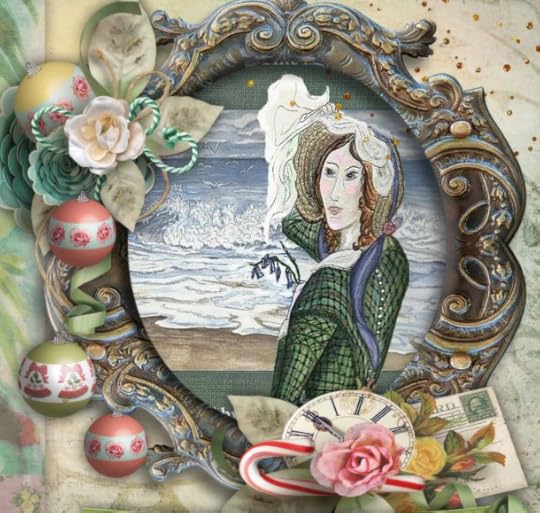
 ©Artwork and writing, unless otherwise indicated, are the property of Diane M Denton. Please request permission to reproduce or post elsewhere with a link back to bardessdmdenton. Thank you.
©Artwork and writing, unless otherwise indicated, are the property of Diane M Denton. Please request permission to reproduce or post elsewhere with a link back to bardessdmdenton. Thank you.
January 1, 2021
Farther On My Road Today
On this New Year’s Day 2021, I was reminder by the first two stanzas of this poem by Christina Rossetti (Old and New Year Ditties) of why I was and continue to be compelled to write my current work-in-progress novel about her, and how in sync I am with her melancholic hope and sensibilities:
New Year met me somewhat sad:
Old Year leaves me tired,
Stripped of favourite things I had
Baulked of much desired:
Yet farther on my road to-day
God willing, farther on my way.
New Year coming on apace
What have you to give me?
Bring you scathe, or bring you grace,
Face me with an honest face;
You shall not deceive me:
Be it good or ill, be it what you will,
It needs shall help me on my road,
My rugged way to heaven, please God.
 Christina Rossetti and her Mother Frances Rossetti, 7th October 1863, by Charles Dodgson (AKA Lewis Carroll)
Christina Rossetti and her Mother Frances Rossetti, 7th October 1863, by Charles Dodgson (AKA Lewis Carroll)Here is the rest of the poem, no doubt more overtly religious than I am, but full of rich spiritual contemplation I cannot help but relate to:
Watch with me, men, women, and children dear,
You whom I love, for whom I hope and fear,
Watch with me this last vigil of the year.
Some hug their business, some their pleasure-scheme;
Some seize the vacant hour to sleep or dream;
Heart locked in heart some kneel and watch apart.
Watch with me blessed spirits, who delight
All through the holy night to walk in white,
Or take your ease after the long-drawn fight.
I know not if they watch with me: I know
They count this eve of resurrection slow,
And cry, ‘How long?’ with urgent utterance strong.
Watch with me Jesus, in my loneliness:
Though others say me nay, yet say Thou yes;
Though others pass me by, stop Thou to bless.
Yea, Thou dost stop with me this vigil night;
To-night of pain, to-morrow of delight:
I, Love, am Thine; Thou, Lord my God, art mine.
Passing away, saith the World, passing away:
Chances, beauty and youth sapped day by day:
Thy life never continueth in one stay.
Is the eye waxen dim, is the dark hair changing to grey
That hath won neither laurel nor bay?
I shall clothe myself in Spring and bud in May:
Thou, root-stricken, shalt not rebuild thy decay
On my bosom for aye.
Then I answered: Yea.
Passing away, saith my Soul, passing away:
With its burden of fear and hope, of labour and play;
Hearken what the past doth witness and say:
Rust in thy gold, a moth is in thine array,
A canker is in thy bud, thy leaf must decay.
At midnight, at cockcrow, at morning, one certain day
Lo, the Bridegroom shall come and shall not delay:
Watch thou and pray.
Then I answered: Yea.
Passing away, saith my God, passing away:
Winter passeth after the long delay:
New grapes on the vine, new figs on the tender spray,
Turtle calleth turtle in Heaven’s May.
Though I tarry wait for Me, trust Me, watch and pray:
Arise, come away, night is past and lo it is day,
My love, My sister, My spouse, thou shalt hear Me say.
Then I answered: Yea.
For me, this piece – Reminiscence – by Chopin fits the mood and reflection of Christina’s poem
Wishing you health, fulfillment,
love, and peace
for 2021 and beyond.


©Artwork and writing, unless otherwise indicated, are the property of Diane M Denton. Please request permission to reproduce or post elsewhere with a link back to bardessdmdenton. Thank you.
December 24, 2020
Music on Christmas Morning (Revisited Once Again)
Anne knew life couldn’t fail her as long as she acknowledged the blessings of animals and nature, music and prayer.
from Without the Veil Between
My vision for Without the Veil Between, Anne Bronte: A Fine and Subtle Spirit was to explore and expand the “asides” of Anne’s life in and out of the context of the more familiar Brontë narrative: one being her fondness for music (a subject that, as those who have read my first two novels will know, I love to write about).
At an early age, along with her siblings, she was taken by her father to concerts performed by the Haworth Operatic Society and in nearby Keighley. In the mid-1830s Reverend Brontë surprised his children by purchasing an upright cabinet piano made by John Green of Soho Square, London.
 Piano in Patrick Bronte’s study in the Haworth Parsonage
Piano in Patrick Bronte’s study in the Haworth ParsonageTheir father arranged for them to have a few lessons at the parsonage, but mostly they were self-taught. Emily, whom Anne was extremely close to, is said to have been the most accomplished pianist in the family. Charlotte’s friend (and to them all) Ellen Nussey wrote of Emily playing “with brilliance and precision.”
“Come on.” Emily dropped the shoes she had seemed so desperate to find and, not allowing Anne to put on hers, pulled her sister out of the rocking chair.
“What?”
“It’s time for Mendelsohn.”
“On the piano? It’s almost eleven.”
“Who’s to mind?”
With their father and Charlotte away, Emily couldn’t be stopped from opening the windows in almost every room and occupying herself on the cottage piano in the Reverend’s study any time she pleased. Yet, Anne, who rarely went out of the house without Emily and then only into the front garden or the church to refresh the flowers by the pulpit, hadn’t heard Emily playing, not even the music Anne had given her for her birthday.
“You’ve been practicing. But when?”
“In the wee hours, as lightly as I walk about.”
“Oh. That explains—” Anne didn’t reveal her entire thought, standing to the side and holding the flickering light that illuminated the sheets Emily hardly needed to look at. She wondered how in the dark of a new day with a candle placed precariously on the corner of the piano’s lid, Emily managed to follow the score well enough to commit it to memory as well as perfecting by heart how gracefully and unpretentiously it sang without words. Anne heard it then, as she had in her dreams, something of William in its wordlessness, something of herself in its longings, something almost tender about Emily that except in her constant forgiveness of Keeper might otherwise never be revealed.
from Without the Veil Between
 Auld Lang Sang as copied by Anne Bronte
Auld Lang Sang as copied by Anne BronteAnne also played, as Ellen Nussey claimed, preferring “soft melodies and vocal music. She sang a little; her voice was weak, but very sweet in tone.” As a governess, Anne gave music and singing lessons, purchasing much of the music herself. At home, in June 1843, on a brief holiday from her position at Thorpe Green, she began copying her favorite music into a blank notebook she had probably purchased on a visit to York with her employers, the Robinsons, spending a fairly substantial sum in relation to her earnings.
Mick Armitage performing two songs from Anne Brontë’s music book
Anne was on the second page of filling the music manuscript book she had only counted on costing her three shillings and six pence, not the favorable opinion of her favorite sister. Her last trip to York, longer than when she and Branwell had met their father there and this time sanctioned for shopping, allowed Anne almost two hours away from the Misses Robinson. While they spent their time and money on dresses, hats, and confections, Anne browsed a bookstore newly opened in the cathedral city, considering any expenditure carefully. She finally settled on two purchases: a German dictionary and a fabric-bound book for music copying that would also aid in her teaching, more of a justification than reason for buying it. Anne wanted to make the music she loved compactly portable, even without access to a pianoforte, available for performances in her head—preferably so, for then her fingers were agile and her voice wasn’t weak.
from Without the Veil Between
 The Shambles, York
The Shambles, YorkAnne’s brother, Branwell, also had musical ability and played the organ from time to time for services in the Haworth Parish church. Unfortunately, none of his talents, including writing and painting, could override his self-pitying, self-destructive personality, which spiraled him into deadly addictions to drink and drugs.
[William’s] arm around her brother’s shoulder, assuring Branwell his return to the organ wasn’t spoiled by him losing his place in the processional hymn All Praise to Our Redeeming Lord and struggling with uncertain pedaling and clumsy fingering in Love Divine, All Loves Excelling, was an embrace of [Anne], too.
“In the end, my friend, you found your way,” William’s cheeks were almost crimson, little streaks of sweat on them, “with Hark, I Hear the Harps Eternal.” from Without the Veil Between
 Haworth Church and Parsonage
Haworth Church and ParsonageI try not to project myself into any historical person I write about, hoping to understand and interpret him/her as objectively and historically accurate as possible. However, fiction (and even biographies) beg some subjectivity in order to go deeper than the facts and explore, for example, his/her motivations, hesitations, impulses and emotions. Although I chose to write about Anne, I never expected to feel such affinity with her on so many levels.
One of the ways I related to Anne was in how her creative talents affected her life as she developed as a writer. Writing became her work, her vocation: she knew it was her most significant means of expression although not her easiest. It involved much of her time, and, also, her mental, emotional and even physical energy, was often frustrating and misunderstood. She had to do it, no matter the trials it put her through, and it seems there were times, especially in the composing of her second novel, The Tenant of Wildfell Hall, that she was nearly buried in it.
As her sister Charlotte wrote in a letter: ‘I would fain hope that [Anne’s] health is a little stronger than it was – and her spirits a little better, but she leads much too sedentary a life, and is continually sitting stooping either over a book or over her desk – it is with difficulty one can prevail on her to take a walk or induce her to converse.’
In contrast music and art and Anne’s bond to nature were truly enjoyment, allowing her times when she could look up from her weighty sense of purpose and view a lighter, more leisurely way of being.
 Anne Bronte’s unfinished portrait of her dog, Flossy
Anne Bronte’s unfinished portrait of her dog, FlossyCertainly, in difficult times, such as her years as governess at Blake Hall and then Thorpe Green, including Branwell’s disastrous stint as tutor at the latter location, music was a relaxing and pleasant pastime that interrupted Anne’s struggles with her health, duties, and worry and embarrassment over her brother’s behavior.
Like at the Spa in Scarborough, during one of her summer holidays there with her employers, the Robinson’s …
Nothing was more calming to her lungs than sitting among other reverent music lovers—which Elizabeth and Lydia were not—in the Spa’s turreted Saloon, melting into a Mozart symphony, an air by Weber, and a Rossini overture. At least, as the music swelled and soothed and satisfied, she was unaware of any physical discomfort from the afternoon’s rising temperature let alone her earlier asthma episode.
from Without the Veil Between
 The Spa, Scarborough, Yorkshire
The Spa, Scarborough, YorkshireOr on a sultry first day of rush-bearing, a magnificent Oratorio concert right in Haworth and her own church, St. Michaels and All Angels …
The voice of Mendelssohn’s Christ in three-part chorus rose, not only creating a miraculous sound but also a haloed light.
Anne wanted to be in that moment. Such bountiful music, the church filled with contemplative commentary drawn from the New and Old Testaments, chorales in the manner of Bach, fanfares punctuating more tranquil instrumentals and vocals. It was quite a trick for the orchestra, even reduced as it was, to fit into the church, the violins arranged around the cellos and violas, the strings in front of the winds, and the brass elevated at the very back. The choir was in front of the instrumentalists, sopranos and tenors on the right, mezzo sopranos, altos, and basses on the left.
from Without the Veil Between
 Rush-bearing 1821
Rush-bearing 1821Or during an impulsive trip to London with Charlotte, which as unexpectedly found her at the opera in Covent Garden …
Enjoy yourself. Don’t worry about critics or how you must answer them, or Papa or Emily or Branwell … or anything to disturb the wonder of this unexpected adventure …
She didn’t think Mr. Smith Williams was reading her thoughts but wanting to witness her enthusiastic participation in the custom of applauding for the conductor as he quickly stepped into the pit, took his place and a bow, and turned to prompt the orchestra’s tuning up.
There was some movement behind the curtain, the footlights burning brighter as Anne’s attention focused on the stage. “This is beyond my dreams. Beyond what I deserve.” She lifted her hands to her cheeks flushed, as Mr. Smith Williams might assume, with pleasure and embarrassment, but really just the warmth and closeness of the theater.
“Oh, Miss Brontë, you’re more than worthy to be here.” Mr. Smith Williams was prompted by Anne’s admission to make one of his own. “I think you’re a perfect companion for attending the opera, for I suspect you understand how music—”
“Kindly bids us wake. It calls us, with an angel’s voice, to wake, worship, and rejoice.”
from Without the Veil Between
 Italian Opera House Covent Garden, London
Italian Opera House Covent Garden, LondonAnne’s Music on Christmas Morning was included in the poetry anthology she and her sisters published in the spring of 1846. It reflects Anne’s piety and love of music, words and nature, using all to paint a lyrically poignant bridge between heaven and earth.
MUSIC ON CHRISTMAS MORNING
By Anne Bronte
MUSIC I love–but never strain
Could kindle raptures so divine,
So grief assuage, so conquer pain,
And rouse this pensive heart of mine–
As that we hear on Christmas morn,
Upon the wintry breezes borne.
Though Darkness still her empire keep,
And hours must pass, ere morning break;
From troubled dreams, or slumbers deep,
That music kindly bids us wake:
It calls us, with an angel’s voice,
To wake, and worship, and rejoice;
To greet with joy the glorious morn,
Which angels welcomed long ago,
When our redeeming Lord was born,
To bring the light of Heaven below;
The Powers of Darkness to dispel,
And rescue Earth from Death and Hell.
While listening to that sacred strain,
My raptured spirit soars on high;
I seem to hear those songs again
Resounding through the open sky,
That kindled such divine delight,
In those who watched their flocks by night.
With them, I celebrate His birth–
Glory to God, in highest Heaven,
Good-will to men, and peace on Earth,
To us a Saviour-king is given;
Our God is come to claim His own,
And Satan’s power is overthrown!
A sinless God, for sinful men,
Descends to suffer and to bleed;
Hell must renounce its empire then;
The price is paid, the world is freed,
And Satan’s self must now confess,
That Christ has earned a Right to bless:
Now holy Peace may smile from heaven,
And heavenly Truth from earth shall spring:
The captive’s galling bonds are riven,
For our Redeemer is our king;
And He that gave his blood for men
Will lead us home to God again.
Whether you read this post and Anne’s poem on the morning it was written in honor of, or at any other time, I want to offer my heartfelt appreciation for your visit to my little space in the universe along with wishes for many blessings to be yours in this season however you mark it.
Peace and Love
 Copyright 2012 by DM Denton
Copyright 2012 by DM Denton
©Artwork and writing, unless otherwise indicated, are the property of Diane M Denton. Please request permission to reproduce or post elsewhere with a link back to bardessdmdenton. Thank you.
December 19, 2020
Farewell to thee! but not farewell
by Anne Brontë
Farewell to thee! but not farewell
To all my fondest thoughts of thee:
Within my heart they still shall dwell;
And they shall cheer and comfort me.
O, beautiful, and full of grace!
If thou hadst never met mine eye,
I had not dreamed a living face
Could fancied charms so far outvie.
If I may ne’er behold again
That form and face so dear to me,
Nor hear thy voice, still would I fain
Preserve, for aye, their memory.
That voice, the magic of whose tone
Can wake an echo in my breast,
Creating feelings that, alone,
Can make my tranced spirit blest.
That laughing eye, whose sunny beam
My memory would not cherish less; —
And oh, that smile! whose joyous gleam
Nor mortal language can express.
Adieu, but let me cherish, still,
The hope with which I cannot part.
Contempt may wound, and coldness chill,
But still it lingers in my heart.
And who can tell but Heaven, at last,
May answer all my thousand prayers,
And bid the future pay the past
With joy for anguish, smiles for tears?

Illustration by DM Denton from Without the Veil Between,Anne Bronte: A Fine and Subtle Spirit
December 19, 1848 was a tragic day at the Brontë Parsonage, Haworth, West Yorkshire, England, for Anne, Charlotte, and their father, Patrick.

Illustration by DM Denton from Without the Veil Between, Anne Bronte: A Fine and Subtle Spirit
Only a few months after brother Branwell passed from their lives, beloved sister Emily followed him. One can only imagine the grief of losing two siblings and children so soon one after the other – not the first time this had happened for the Brontë family and not made easier by being just before Christmas, a time when they usually found themselves come together again after being away from home.

I wrote about the closeness (“like twins … inseparable companions, and in the very closest sympathy, which never had any interruption” ~ Ellen Nussey) of Anne and Emily Brontë in a previous post: The Very Closest Sympathy.
Writing the scenes of Emily’s death in my novel Without the Veil Between, Anne Brontë: A Fine and Subtle Spirit happened to correspond to a time in 2017 when I was grieving the loss of my beloved Gabey-kitty (his brother Darcy passed a few months later).

‘When we are harassed by sorrows or anxieties, or long oppressed by any powerful feelings which we must keep to ourselves, for which we can obtain and seek no sympathy from any living creature, and which yet we cannot, or will not wholly crush, we often naturally seek relief in poetry . . .’
~ Anne Brontë, Agnes Grey
Or, in my case, prose …
“‘Powerful’. ‘Interesting’. ‘Coarse’. ‘Brutal’. ‘Morbid’. Do we write with any such adjectives in mind?” Anne had been reading through the reviews of Tenant she had collected, portions aloud to Emily, especially those that might stir any fight left in her. “Or go through the tormenting process of writing a novel for ‘reveling in scenes of debauchery’?”
Emily was quiet lying sideways on the sofa in the parlor. Since Anne had repositioned the pillow borrowed from one or other of their beds, Emily’s head had slipped to bow against her frail neck. Her torso was curled so her length was contracted, no definition to her arms or bosom within the sleeves and bodice of her dress, no movement under its skirt since Anne had lifted her sister’s skeletal legs up more than an hour before.
Anne wondered if Emily was still pulled by the brutishness and beauty of the moors and the similar punishment and reward of writing. Did a look out a window or opening of a door remind her of what she was missing, and new Gondal rascals or Heathcliffs or Catherines find her imagination receptive? Anne longed for one more conversation with her, whether playful or intense, one more chance to agree, argue and confirm they were good for each other’s inspiration, intellects and souls. Anne ached for one more meeting with the Emily who was wiry but robust, strong like a man and simple like a child, her head full of logic and fantastic stories at the same time, her choices uncompromising, as were her passions. If only Emily’s life could return to being routine and yet so exceptional, filled with writing brilliantly while she was bread making or sewing or everyone else was asleep, making music like a perfect lady and rambling the Pennine way like a free and easy lad.
Instead, Anne had to helplessly watch as Emily continued to disappear through those December days and nights. On that Monday evening, a week before Christmas, her stillness, half-open eyes and mouth, and leaning towards resignation indicated there was only one way she would be released from consumption’s captivity.
~ from Without the Veil Between, Anne Brontë: A Fine and Subtle Spirit

Anne and Emily from a painting by their brother, Branwell
I know that ghosts have wandered on earth. Be with me always—take any form—drive me mad!
~ from Wuthering Heights, by Emily Brontë
 ©Artwork and writing, unless otherwise indicated, are the property of Diane M Denton. Please request permission to reproduce or post elsewhere with a link back to bardessdmdenton. Thank you.
©Artwork and writing, unless otherwise indicated, are the property of Diane M Denton. Please request permission to reproduce or post elsewhere with a link back to bardessdmdenton. Thank you.
December 5, 2020
Christina Rossetti: The Birthday of Her Life
The rivers run as they ran,
Through clouds or through windy reeds
All run as when all began.
from
Time Flies, A Reading Diary
by Christina Rossetti
December 5th entry
(First published 1885)
[image error]
Christina is the subject of my work-in-progress next novel, The Dove Upon Her Branch.
[image error] From left to right: Christina, Dante Gabriel, Frances (mother), William, and Maria Rossetti
Photograph by Charles Dodgson, AKA Lewis Carroll
1863
She was part of a remarkable family of English-Italian scholars, artists, and poets, her older brother being Dante Gabriel Rossetti, founder of the Pre-Raphaelite Brotherhood. I wrote a brief bio of her for The Literary Ladies Guide.
[image error] Christina Rossetti by Dante Gabriel Rossetti
Today is the 190th anniversary of her birth, December 5, 1830
A Birthday
By Christina Rossetti
My heart is like a singing bird
Whose nest is in a water’d shoot;
My heart is like an apple-tree
Whose boughs are bent with thickset fruit;
My heart is like a rainbow shell
That paddles in a halcyon sea;
My heart is gladder than all these
Because my love is come to me.
Raise me a dais of silk and down;
Hang it with vair and purple dyes;
Carve it in doves and pomegranates,
And peacocks with a hundred eyes;
Work it in gold and silver grapes,
In leaves and silver fleurs-de-lys;
Because the birthday of my life
Is come, my love is come to me.
[image error] from Ecce Ancilla Domini, or The Annunciation
by Dante Gabriel Rossetti
Excerpt from The Dove Upon Her Branch
Christina and William Rossetti posing
for the painting of Ecce Ancilla Domini
by Dante Gabriel Rossetti
in November 1849
Another painting to pose for offered an alternative, productive engagement, being the handmaiden of the Lord a worthy occupation. William’s participation, not only as someone to accompany Christina to and from where Gabriel now worked on Newman Street above a hop-shop, but also to portray the Angel Gabriel, made for a happy distraction of camaraderie and creation with her brothers.
“Why is the painting tall and narrow?” Christina wondered with her first glance at the work in progress.
“It is one-half of a diptych. Its companion will depict the Virgin’s death.”
“Will you have both finished by spring for the RA?” William slapped his arms around himself in an attempt to warm his sleeveless, sheeted body. “Any more coal for the grate?”
“Doubt it.” Gabriel urgently picked through the pile of brushes on the small pedestal table next to his easel.
Christina noticed they were all thin-handled and fine-bristled.
“No wonder it will take so long.” She also looked at his pallet, noticing he wasn’t mixing colors but using fresh daubs of unadulterated white, blue, and red paint.
“I hope you won’t get bronchitis again.” William repositioned the woolen shawl that had slipped off her shoulders.
“I haven’t even caught a cold.” Christina had resigned herself to shivering in her flimsy nightgown for the sake of Gabriel’s vision and to prove as enduring as any of the other models who sat for him.
“Interesting.” As he leaned forward, William put a hand on his brother’s back. “Even with as little as you’ve done, I see the perspective of Giotto. Yet, I also see Flemish primitive, what you and Hunt were so taken with in Bruges. Before you started, I noticed you had followed Van Eyck’s practice of preparing the canvas with white ground.”
Gabriel smiled, probably more because of his own thoughts than William’s. “I’m sure it will all seem a confused mess to those, like Ruskin, who think their opinions matter.”
“A risk worth taking. But you must enter both panels together.”
“I don’t paint to exhibit.”
“You have to make a name for yourself, Gabe, a living. Your work has to be seen. And critiqued.”
“Says the would-be critic.”
“Now I see why you want me contorted on a corner of that saggy cot.” Christina though it wise to change the subject. “And all crinkly and looking about to jump up and run away.”
“I thank Collinson for your disquiet.”
They had spoken of many things during the hours of posing and painting, breaking to eat and drink, and for Christina and William to wrap themselves in blankets long enough to feel their fingers and toes again. Not once, until that moment, considering Gabriel was still brooding over Mr. Hunt falling into arrears with the rent at the Cleveland Street studio and defecting to James’ in Brompton, had anyone mentioned the man Christina had, without good reason, agreed to marry. She was almost convinced the last year of his waxing and waning hadn’t happened; that somewhere out there was the face not seen, the voice not heard, the heart that had not yet—
Or, maybe they had been and it would if only it could.
Copyright © DM Denton 2020
[image error] Ecce Ancilla Domini, or The Annunciation
by Dante Gabriel Rossetti
Brief was the day of its power,
The day of its grace how brief:
As the fading of a flower,
As the falling of a leaf,
So brief its day and its hour …
from
Time Flies, A Reading Diary
by Christina Rossetti
December 5th entry
(First published 1885)
[image error] Christina Rossetti by Dante Gabriel Rossetti 1877
Sing, that in thy song I may
Dream myself once more a child
from Maud by Christina Rossetti
[image error]Christina Rossetti as a child, by William Bell Scott
Happy Birthday, Christina Rossetti
[image error]
©Artwork and writing, unless otherwise indicated, are the property of Diane M Denton. Please request permission to reproduce or post elsewhere with a link back to bardessdmdenton . Thank you.
November 29, 2020
The Gift of a Story
Based on true events …
In Depression-weary times, a little girl’s wish for a special doll touches a stoic heart. Through sacrifice and pure intent, giving her what she wants results in disappointment but eventually confirms that love and patience can work magic.
Time for another short story,
a seasonal one
for every season
The Snow White Gift
by DM Denton
A childish gasp greeted the wide-eyed porcelain doll. The exploration of a trunk full of old clothes uncovered it, eager hands lifting it from lying so long on its back in the dark. It blinked, dropped its arms, stretched its legs and lowered its chin while its sleeves were pinched out. An attempt was made to smooth the creases in its skirt and cape; the ribbon in its hair retied. Other than twisting awkwardly when it was hugged like a long lost friend, it offered no resistance to being rescued from what might have been the end of its story.
The Snow White Gift is available to read in its entirety on Kindle devices or for most other devices by downloading the Kindle app.
FREE if you have Kindle unlimited!
The story’s illustration by DM Denton is available as a print from DM Denton’s Artspan Site
Options for matting and framing available
[image error] Copyright 2013 by DM Denton
©Artwork and writing, unless otherwise indicated, are the property of Diane M Denton. Please request permission to reproduce or post elsewhere with a link back to bardessdmdenton. Thank you.
[image error]
October 31, 2020
The Staircase
A new short story
written and illustrated by DM Denton
author of
Without the Veil Between, Anne Brontë: A Fine and Subtle Spirit
The Staircase
is based on true events
surrounding a haunting by Anne Brontë
and is included in the recently released anthology
I Know That Ghosts Have Wandered the Earth
Who?
At first, I didn’t think the question was directed at me. I didn’t want to be seen. If by some unintended wish I was, I didn’t feel inclined to answer, to reveal more than I had already.
I didn’t want to be rude, either, the manners Aunt Elizabeth had instilled in me continuing to influence my judgment.
It was the staircase I meant to be present for as I moved out of the shadows and onto its wide bottom step, Queen Anne in its demeanor and mine. Would there be the smell of polish and creaking on certain steps, its handrail smooth, cold, and substantial beneath my small hand? It was a miracle that I had found it again, and myself as eager and expectant as when the journey to my independent future packed more illusions—especially of the juvenile variety—than clothes.
The staircase had darkened with age but in its afterlife had been restored for a brighter environment. Gone was the eighteenth-century oak paneling of its first home that eclipsed the rare beauty of its burred yew unless a candle was held near. Now surrounded by white-washed walls and ceilings, and light-fixtures with flames that didn’t flicker, the imperfections of the staircase’s wood glowed.
Once again it seemed I was alone, or, at least, without anyone realizing my presence pretending to be other than it was. The first time I stepped onto the staircase I was still in awe of Blake Hall’s magnificence and certain I was at the threshold of an exciting time in my young life. In terms of my own actions, maintenance, faculties, and possibilities, I was just beginning.
I intended to make the most of an opportunity for refinement and worthiness.
It was April 1839. I was taken up a back way to a small but comfortable bedroom to briefly revive with refreshment and rest, leaving little time to tidy my appearance before I emerged less than an hour later. I walked along a paneled and papered hallway to a grander way down to meet new responsibilities, convinced the society below would put my shyness and insecurities at ease and improve and cultivate me. Lifting the mud-splattered hem of my skirt, I wished it clean and my petticoats, too, although I was wearing only one. I saw skimpy slippers on my feet rather than sensible boots. Somewhere, probably the drawing room, a piano was being played and there was singing, the latter much less in tune, but, as a young female child’s voice often was, sweet and pretty.
My optimism in being entrusted with the care and education of children was enthused until I heard mockery and crying.
A door slammed.
A rude boy, no more than six or seven, bounded up past me, while the same stately woman who had met my arrival earlier with nothing more than was necessary to say, stood at the bottom of the stairs expressionless.
I could go no further in that disagreeable direction.
I hadn’t followed the fate of the staircase to revisit the pomposity, unpleasantness, and worse of the Inghams, or my own wickedness that I wasn’t proud of but seemed necessary at the time. I closed my eyes, counted to ten, opened them, and all that remained was my flight of fancy on those stairs.
My faith had prepared me to settle in heavenly peace where I was reunited with those I loved, one in particular even more agreeable in the hereafter. I was rarely nostalgic for the life I had abandoned too soon, especially once Charlotte and Flossy were with me again. I have to—affectionately—blame Emily, who was still into haunting, for alerting me to the demolition of Blake Hall after what was salvaged of its character and worth had been auctioned off. That was as far as Emily was willing to go with the news, while Charlotte had long ago grown disillusioned with London, so I made a second trip there on my own.
Of course, I could do nothing but watch the dealings that started at a Kensington antiques fair, continued miles away in a damp, dusty warehouse, and culminated in the staircase’s sale and a plan to send it to be reassembled even farther away from fitting in.
By then, I was curious about the couple who had crossed the Atlantic to flaunt their money and steal a little of the old world to the new. Giving into the temptation to eavesdrop on Allen and Gladys Topping during their return voyage, I meant to limit my spying to their discussions about “the English treasures” purchased for their new house on a “long island”. Instead, my fascination with their engaging if sometimes vulgar speech and mannerisms and Gladys’ spontaneous operatic singing, which made her husband’s eyes shine, became an inexcusable intrusion upon their privacy.
No sooner I returned to time without measure than Allen Topping was there. I wanted to ask him about the staircase but decided not to because he didn’t know me. He was greeted by a crowd of condolences for the loss of his wife. I often wondered if William ever felt bereaved over what might have been between us, but I was still too shy to ask him. Heaven, like earth, was full of unfinished love stories. I knew Allen would be all right.
Gladys would be, too, for, as my dearest Flossy told me, Allen had left her with a special gift.
“Mr. Wyk, what is it?”
Mr. Wyk reminded me of Emily’s Keeper, intimidating until he wagged his tail and nuzzled my hand for a treat he wasn’t supposed to have. I was sure he was a comfort to his mistress who, unlike Emily, had no rules that kept him off her bed or from roaming anywhere in the house. Not that Emily and Keeper were less devoted to each other, their reunion as intensely emotional as mine had been with Flossy.
“Mr. Wyk?”
The young Doberman Pincher ran up the stairs to the first landing, his snout down on his front paws and his spine rising as he resumed growling.
I began to ascend, thinking to put him at ease again, but he backed away whining and turned to Gladys. She had one hand over her mouth while the other lifted a chamber stick that illuminated the fear and curiosity in her eyes.
I waited for the question I didn’t want to answer.
Who? it came, although it wasn’t spoken.
Quickly, once and for all, in a whisper meant to be an impression, I told her.
I was surprised she had heard of me, also of my sisters and brother, and had even seen the lovely moors.
“Ah, she’s gone.” Gladys stroked Mr. Wyk’s ears and went down the stairs. I moved aside, forgetting I didn’t need to. The faithful dog wanted to follow her but waited for me to gesture him to.
“You must be hungry, Mr. Wyk. Will anyone believe we saw her? I wonder if she’ll be back.”
I have been, but not so Gladys has actually observed me again. It’s hard to be sure about Mr. Wyk; perhaps he no longer sees anything unusual in my visits.
I often make a detour to catch a sunrise over the ocean from one of Quoque’s beaches, before returning to Sanderling where I like to go up and down the staircase, rather like a madwoman, which I would never have done in life, or, hopefully, put in a novel. Sometimes, I offer little noises and other signs that get Gladys’ attention but don’t disturb her too much or give away more than I have already.
[image error] Copyright © 2020 by DM Denton
Read about the actual events that inspired The Staircase:
https://www.examinerlive.co.uk/news/west-yorkshire-news/spooky-tale-haunted-anne-bronte-8350862
[image error]
I Know That Ghosts Have Wandered The Earth
is available on Amazon
in paperback and for kindle devices and app:
US
UK
Profits go to the Brontë Parsonage Museum,
which like so many cultural institutions is struggling financially
during the pandemic.
A collection of illustrated stories and poetry
by members of the Facebook Page
A Walk Around the Bronte Table
compiled by Kay Fairhurst Adkins
More than 200 years since their births, the ghosts of the famous Bronte family – Charlotte, Branwell, Emily, and Anne – haunt their eager fans through novels, poetry, and the fascinating true story of genius tucked into unlikely spaces. It is all here waiting for you in this collection of spine-tingling Bronte-Inspired Ghost Stories, Local Legends, Paranormal Experiences, and Channelings. As one of our authors, Danette Camponeschi, says in her story Keepers of the Truth, “When shut inside during our own time of horror – while the world sleeps and waits and holds its collective breath – we continue the tradition of storytelling in our own way, keeping the truth alive and the imagination flourishing.” Open the cover of this book and enjoy a moonlit ramble on the moors. You never know what you’ll find…or what will find you…
[image error]
Without the Veil Between, Anne Brontë: A Fine And Subtle Spirit
is available on Amazon
in paperback and for kindle devices and app:
US
UK
©Artwork and writing, unless otherwise indicated, are the property of Diane M Denton. Please request permission to reproduce or post elsewhere with a link back to bardessdmdenton. Thank you.
[image error]
October 25, 2020
The Singing Lesson
As promised, more excerpts from my publications. Two this time, from A House Near Luccoli and its sequel To A Strange Somewhere Fled
[image error]
She knew what she shouldn’t do. But the harpsichord’s graceful frame wasn’t the only one within reach.
“I told you, don’t lean on anything!”
She was forgiving and forgiven, but mostly frustrated with her voice that felt trapped in her head.
“Sigh.”
“Sigh?”
“Like the wind worked into a gale.” Alessandro stood up and took her in his arms, his fingers climbing her spine.
Surprise disguised shame as she didn’t resist him.
“Most singers won’t wear corsetti. Haven’t you noticed the size of their waists?”
She wondered how he might make fun of her.
“No frowning. Sing and weep. Never frown.” He lifted her arms. “Sigh. For me.”
She had to admit he was making it easier and easier to do so.
“Keep your arms up.” His hands pushed against her diaphragm. “Make it a sliding note, higher, higher,” he dropped them from the inflation of her breasts, “with body and voice until you can’t feel any difference,” to her waist. “Reach from your toes.”
She held on to pleasing him and not just as he wanted her to sing. She was learning, positioned to rise above the inexperience of her voice and fall for the consequence of his instruction, forgetting herself and willing to defy anyone or anything that might prevent her going further. He clapped and returned to the harpsichord, propping a knee on its seat, his fingers leading on the keyboard, his eyes directed toward the lyrics in front of him.
She added them to the tune she wasn’t familiar with, either, faltering, like a baby beginning to talk or her father attempting Italian. Alessandro realized he was playing too fast, not patient but willing to accompany her until she could handle it the other way around. She appreciated his tolerance and did her best to show him, slowly putting the words together into melody and meaning, phrases rolling, his encouragement exaggerating her ability.
He conducted with the sway of his head. “Entice! Enjoy! They’re not just notes, but many avventure, one giving way for the next.”
Her breath and soprano’s range were reaching their limit.
“Don’t struggle. Think of a kiss. Soften your mouth. Open it, lift your tongue.”
She understood how he got himself in trouble but also made the best singers.
“No. Birds. Think of how they hold their bodies and announce their throats before they make a sound. They believe they’re made for singing. They don’t try, don’t strain, and don’t hang on. They know they have to do it.” He gave his hand and heart to the music, remembering a stage warmed by candles and great passions. “Like flying. Or mating. Or dying.”
She was silent.
“You’re giving up?”
“I need a lower key.”
“You don’t.”
“But … you said … the high note isn’t all.”
“Did I?”
“Yes.”
“Sometimes I say things I don’t mean.” He rose to adjust her posture, gentler maneuvering her head, gliding around her. “But always, the range of a voice is like the heart for amore.” Her neck was alert to his next move. “According to the available singers or lovers.”
Donatella continued to imagine someone walking in, whether a suspicious relation or just reliable and unreliable servant bringing limonata or, now it was almost December, mulled wine. A lady would know how to pretend she wasn’t compromised by anything than what was supposed and a gentleman would let her have her innocence.
[image error]
“Oh, I must hear Stradella.” Master Purcell swung out his arms as though into an embrace.
“Let me choose.” Mama was irresistibly devious, lifting page after page.
“Something lighthearted and melodious, if you please.” the young composer’s arms dropped. “As I feel sure he would have wished to entertain us.”
“It is here.”
“No, Mama.” Donatella realized her mother’s discovery and an ache in her stomach.
Master Purcell was soon performing the selected music with his eyes and a delicate finger in the air. “Will you sing it, Mistress?”
“Yes, yes. With my daughter, Donata, as she is shy. It’s her specialty.”
“Really?” Master Purcell screwed his mouth, skeptical but interested.
“In fact, Maestro Stradella might’ve written it for her.”
“Oh, no, Mama. In Rome, before—”
“You knew him?” Master Purcell motioned for Lonati who had been listening without comprehending what should have provoked him into having his say. “I would like to hear this, Carlo. I don’t see a bass viol, but Reggio can improvise. The ladies will sing. There’s only one score.”
“I know it by heart.” Donatella blindly stepped back into her mother’s arms.
“Of course you do, darling,” Mama’s soft voice blew into her ear.
“Ah.” Purcell was watching them closely, and then turned back to Lonati, who was explaining the music to Reggio.
There was the appropriate silence before Lonati was as elegant and amiable with bow and violin as no other activity afforded him. With every stroke, nod and faraway expression, he was an echo of Alessandro, exacting the very best from the composition and the late composer’s nature, generous with his talent, uninhibited with his playing, making the music his own only as he adored it. His reminiscent virtuosity swept Donatella onto the waves of Le donne più bella like a ship with a steady breeze in its sails, Reggio’s archlute-continuo encouraging the rolling sensation. Her mother’s grasp of her arm and escorting vocal weakened, soon leaving Donatella alone with each poetic turn of phrase and melodic ornamentation.
Donatella listened, the sound of her singing always a surprise. She grew more and more trusting as she interpreted the aria with good legato, shading and tone, her jaw relaxed and her tongue in the proper position, her chest lifted but not too proud. Lonati flourished in-between her dreamy declarations, Reggio constant until the end that softened and lingered in harmony with her final passage.
She kept her eyes closed, the silence longer than before the performance, as though her singing had not only used up her breath but everyone else’s, too.
[image error]
Visit the novels’ booklaunch pages for purchase links and more:
A House Near Luccoli
To A Strange Somewhere Fled
[image error]
[image error]
©Artwork and writing, unless otherwise indicated, are the property of Diane M Denton. Please request permission to reproduce or post elsewhere with a link back to bardessdmdenton. Thank you.

